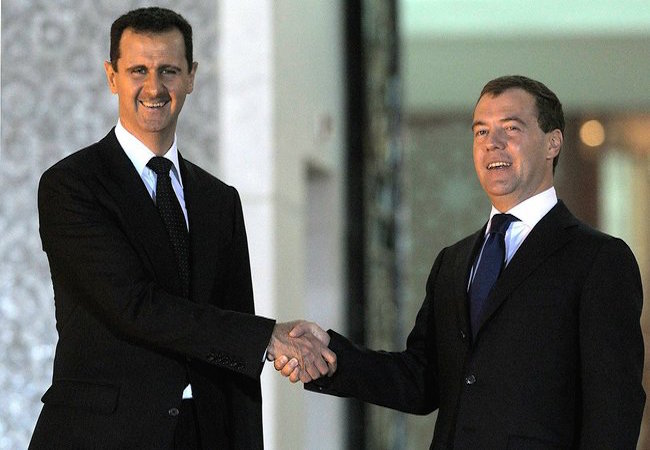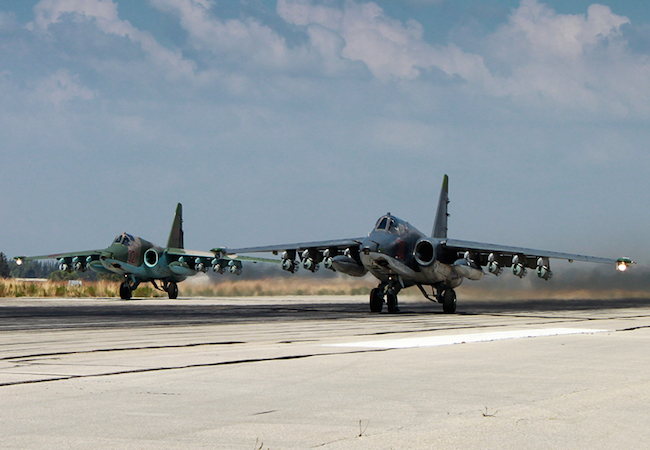Not just about Assad: Explaining the Russian-Iranian axis in Syria

By Jeanette JJ Harper
Russia and Iran – both members of the Caspian Five – believe they have acted as a main force for stability in the Caspian region and the Caucasus. Hidden under the waters of the Caspian Sea is a treasure trove of immense natural wealth, which both countries wish to protect at any cost for themselves.
While these riches are a potential source of conflict, both countries recognize that their efforts to cooperate must begin in the Caspian region because it gives them leverage economically and may even be the key to bolster their negotiating position in the international community writ large. For Russia, this could mean ensuring its geopolitical survival by maintaining its “sphere of special interests” across the former republics of the Soviet Union. For Iran, it could mean strengthening its respective international position and even help it progress towards being a regional kingpin, despite its unique non-Arab ‘outsider’ status.
Thus, both Iran and Russia have a keen interest in keeping the region – particularly Syria – stable and intact along a benign status quo axis. The situation in the Levant is so convoluted that it would take a long time to explain all of the different components. To stay focused on the Iranian-Russian alliance, however, it is important to understand why it is in the interest of the two countries to prop up the Assad regime. To understand why the destabilization of Syria would be devastating to the region, one only has to look at DAESH, which formed in the power vacuum left behind after Saddam’s Baathist government was dismantled. If Syria follows the same trajectory and the Bashar al-Assad regime is ousted, there will be nothing left to stop terrorist groups like al-Nusra, al-Qaeda and DAESH from consuming what is left of Syria and expanding beyond the region. If they spread their influence and ideology to other parts of the world, more countries may find themselves subjected to the same fate. While most of the West is at least peripherally concerned by this danger, countries like Iran and Russia see this in a much more direct and visceral way: to them Syria is not some far away province but a country right in their respective backyards and certainly a major component of their projected spheres of national security interests.
Within the Russian Federation, there are areas with a non-Russian and largely Muslim population in the North Caucasus – like Chechnya and Dagestan. The January 2011 suicide bombing in Moscow’s major commercial airport is evidence of the growing threat these terrorist organizations represent to Russia’s existence and have represented since the early 1990s. Iran also fears terrorist threats that lurk just outside its porous border. However, enigmatic Iran faces an additional two-pronged threat: they are a non-Arab Shiite Persian theocracy with what some consider the most Islamist, militant government in the Middle East. This not only puts them at odds with Sunni terrorist organizations, but with the governments of Iran’s Sunni neighbors that do not appreciate Tehran’s evangelistic efforts to encourage their own Shiite populations to rise up with local insurrections. Additionally, Iran is not popular among the more moderate regimes in surrounding Arab countries.
Clearly, under these circumstances, Russia and Iran believe they must strengthen their relations with each other and with other members of the anti-DAESH coalition, whoever they happen to be. These include Syria, Iraq and Lebanon’s Hezbollah. To further exacerbate the problem, the Iranian-Russian axis believes the United States has deliberately nurtured and encouraged the growth of DAESH in both Syria and Iraq, at least by its overemphasized focus on supporting groups trying to overthrow Assad. Rightly or wrongly, both Iran and Russia feel DAESH exists today as such a problem because America took its eye off the more important global security ball, instead wanting to play ‘democratizer’ in Damascus. Even China has expressed concern over this problem and many believe it could even become the next member of the coalition in Syria.
As Russia and Iran continue to intervene in Syria, many have questioned the true intentions of this alliance. In its airstrike campaigns, Russia has been accused of targeting moderate Syrian rebels – insurgents who have no affiliation with DAESH and in fact rebelled long before the Islamic State came into being. Among the areas that have been hit by Russian airstrikes are supposedly ones that accommodate groups supported by the United States and its allies. Furthermore, Russia skirted around Turkey – which is an ally of the United States and a firm opponent of Assad – to send its military equipment to Syria over the Caspian Sea (rather than the Caucasus isthmus), where the airspace rules are unclear.

While there are many theories surrounding this mystery, one thing is obvious. Relations within this triangle have been strained for a very long time. Until the 1980s, Syria was among Russia’s closest allies in the region and in fact the Baathist regime was more socialist in orientation than most Arab regimes. Syria also provided Russia its only naval base on the Mediterranean – one of its most geostrategic assets. Things got a bit more intense when Vladimir Putin came to power and insisted on maintaining good relations with Israel. But this is in keeping with Putin’s personal foreign policy of cultivating assets that can benefit Russia regardless of how those assets interact with each other. He wryly noted the United States was the other major power in the world that commonly does this.
The alliance between Syria’s pan-Arab secular regime and Iran’s Islamic theocracy was suspicious from the start. It began when Bashar’s father, Hafiz al-Assad chose to support the Iranian revolution as a sign of protest against the US-imposed world order. While Syria and Iran did cooperate with one another on several issues, both countries knew there was a deep, conflicting divergence in their ideological characteristics and regional aspirations. They both knew there would come a time when their divergent political goals would clash with one another. For example, Syria was not impressed with Iran’s backdoor dealings with the Americans and Iran was offended by Syria’s participation in the Israeli-Palestinian peace process and its willingness to make concessions in regards to its territorial stability.
While Russia and Iran are clearly busy building the foundation of a new geostrategic bloc in the region, what is not evident is why Syria – despite the fact that its very survival depends on it – refuses to let go of its attitude of defiance towards the United States and its allies. It appears that Assad believes that this stance will guarantee the support of the Syrian people and ensure the survival of his regime. Unfortunately, the same tactics Assad used to build up his corrupted legitimacy within his own country is working against him now. Because Assad does not have much more than hereditary custom to offer his people as to why he should remain in power, his country has devolved into chaos. One thing is certain: Assad should not assume the Russian-Iranian axis is about propping his regime up personally. In all likelihood, it is much more about maintaining a Syrian territorial space that is open to Russian and Iranian interests and policies. WHO happens to be leading the country doesn’t really matter to these two regional giants, as long as said leader is willing to be a strategic and close partner. For now, that is Assad and Assad only. But that doesn’t mean it can only be Assad moving forward into the future.
Jeanette JJ Harper is a graduate student in the International Security and Intelligence Studies program at Bellevue University in Omaha, NE, USA.




